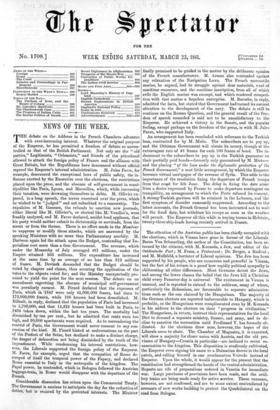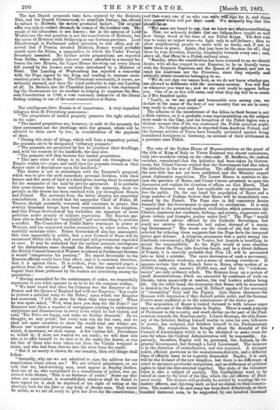The attention of the Austrian public has been chiefly occupied
wait the elections, which in Vienna have gone in favour of the Liberals. . Baron Von Schmerling, the author of the Constitution, has been re, turned by the citizens, with M. Koranda, a Jew, and editor of the Ostdeutsche Post ; M. Franz, a Protestant; Dr. Berger, a Radical ; and M. Mulhfeld, a barrister of Liberal opinions. The Jew has been supported by his people, who are numerous and powerful in Vienna, but the fact of his return is a proof how rapidly political sympathy is obliterating all other differences. Most Germans detest the Jews, and among the lower classes the belief that the Jews kill a Christian child every Passover-day is universal. The excitement in Vienna is unusual, and is reported to extend to the noblesse, many of whom, particularly the Bohemians, are favourable to separate administra- tions such as the one claimed by the Hungarians. The majority of the German electors are reported unfavourable to Hungary, which is probable, as the Hungarians were complimented even by M. Koranda in his address to the electors on their "progress in civilization." • The Hungarians, in return, instruct their representatives for the local _ Diet to demand a separate ministry, finance, and army, and to de- cline to sanction the coronation until Ferdinand V. has formally ab,. dicated. As the elections draw near, however, the hopes of the Liberals seem to abate. The Chamber of Magnates, it is expected,. will show a majority for closer union with Austria, and the old pro. vinces of Hungary—Croatia in particular—are inclined to resist re- annexation to the kingdom. This disposition is studiously cultivated, the Emperor even signing his name to a Dalmatian decree in the local patois, and calling himself in one proclamation Voivode instead of Emperor. Upon the whole, it would appear for the present that the constitution had strengthened the hands of the central administration. Reports are rife of preparations ordered in Venetia for immediate war. Large purchases of provisions have been made, and the artil, lery trains are being made ready for active service. These rumours, however, are not confirmed, and are to some extent contradicted by accounts of new works building to protect the Quadrilateral on the inad from Bologna.
The last Danish proposals have been rejected by the Holstein Diet, and the Danish Government,. to conciliate Europe, has offered to submit to Holistein the entire provincial budget. The original offer was Only to submit demands in excess of the nominal rate. The result of the ultimatum is not known ;• but in the opinion t of Lerch Wodehouse the real question is not the constitution of Holstein, but the union of Holstein with Schleswig as one German province. Lord Ellenborough in Parliament called attention to this affair, and ob- served that if Prussia invaded Holstein, France would probably march upon the Rhine, a supposition to which the Under Foreign Secretary assented. No further active preparations are reported from Berlin, where public interest seems absorbed- in a, contest be- tween the two Houses, the Upper House throwing out every liberal bill passed by the Lower, even when introduced by a Minister, of State. The Landt,ag of Wmtemberg has rejected, a concordat with the Pope signed by the King, and tending, to increase eccle- siastical power in the State. The Protestant community, it seems, are seriously alarmed, and deny the royal authority to sign any Landtag at all. In Bavaria also the Chambers have passed a vote reprimand.. ing the Government for its conduct in helping to suppress the Hes- sian Constitution in 1849, a vote curiously indicative of the liberal feeling existing in one of the most conservative of States.































